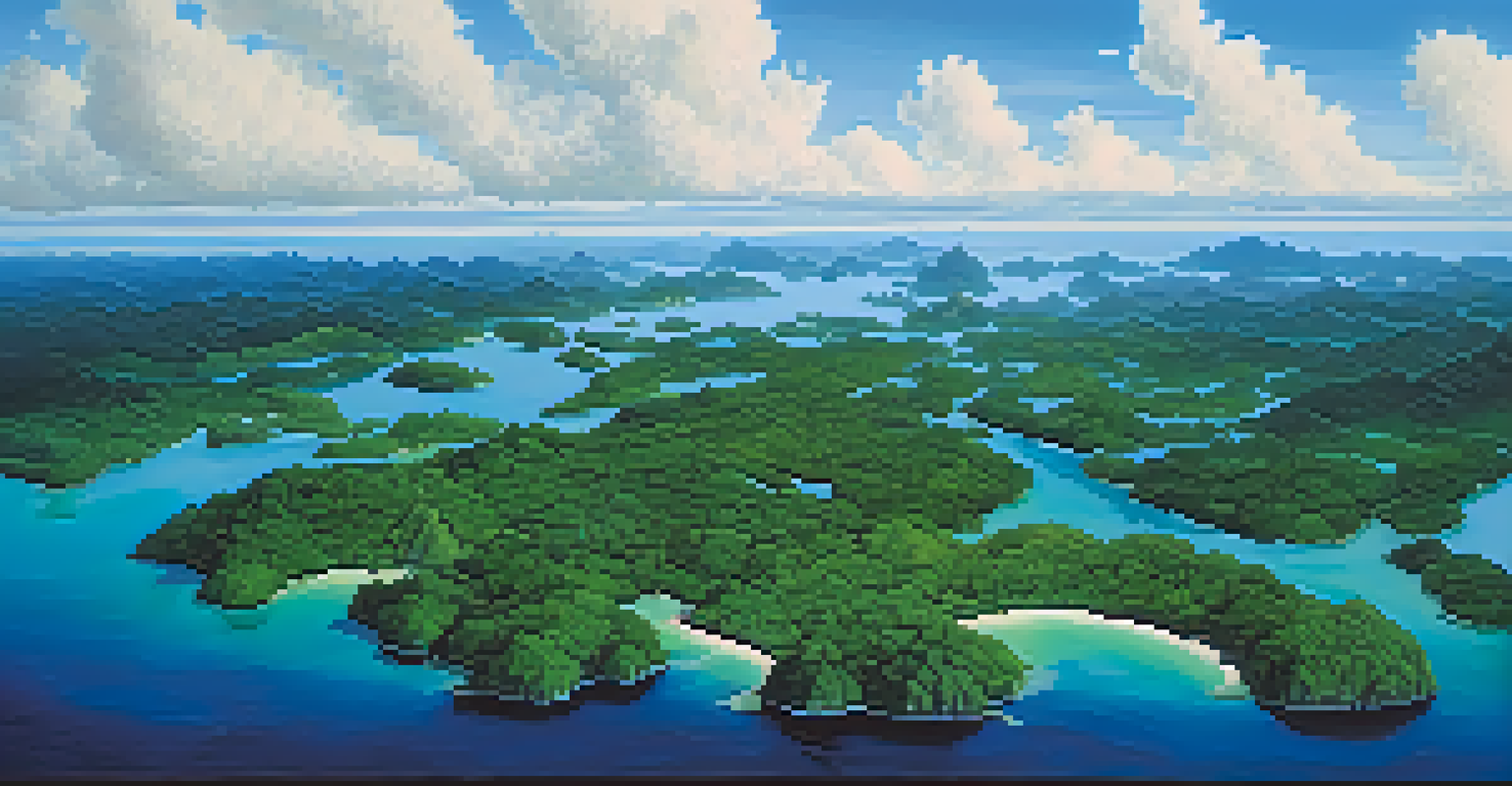Top 10 Ecotourism Destinations in the Amazon Rainforest

Understanding Ecotourism in the Amazon Rainforest
Ecotourism is all about responsible travel that conserves the environment. In the Amazon Rainforest, this means immersing yourself in nature while minimizing your footprint. By choosing ecotourism, you help protect the fragile ecosystems that are vital to our planet.
The Earth does not belong to us: we belong to the Earth.
The Amazon is often referred to as the 'lungs of the Earth' due to its vast trees absorbing carbon dioxide. Each visit supports local communities and conservation efforts, ensuring that this incredible biodiversity is preserved for future generations.
From guided tours to sustainable lodges, ecotourism offers unique experiences that connect travelers with the natural world. It's not just about seeing wildlife; it's about understanding and respecting the environment we share.
1. Manaus: The Gateway to the Amazon
Manaus is often the starting point for many adventurers heading into the Amazon. This bustling city is rich in culture and history, providing a unique blend of urban life and natural beauty. Visitors can explore the famous Amazon Theatre and enjoy local cuisine before venturing into the jungle.

While in Manaus, you can easily access various eco-lodges and tour operators that specialize in sustainable travel. These experiences often include guided jungle hikes, canoe trips, and wildlife spotting, allowing you to truly connect with the rainforest.
Ecotourism Benefits Local Communities
Choosing ecotourism helps support local communities and conservation efforts in the Amazon Rainforest.
Don't miss the Meeting of the Waters, where the dark waters of the Rio Negro meet the sandy-colored Amazon River. This natural phenomenon is not only a stunning sight but also a reminder of the incredible diversity found in this region.
2. The Anavilhanas Archipelago: A Natural Wonder
Located just north of Manaus, the Anavilhanas Archipelago is one of the largest river archipelagos in the world. This stunning area is home to lush rainforest, diverse wildlife, and tranquil waters, making it a perfect ecotourism destination. Travelers can explore its many islands via canoe or kayak.
Traveling – it leaves you speechless, then turns you into a storyteller.
Birdwatchers will be in heaven here, as Anavilhanas boasts over 500 species of birds. From colorful toucans to majestic harpy eagles, the archipelago is a vibrant tapestry of avian life. Plus, the chance to spot pink river dolphins adds an extra layer of excitement.
The eco-lodges in this area are committed to sustainable practices, ensuring that your visit has minimal impact on the environment. Staying in one of these lodges means you can enjoy nature while supporting conservation efforts.
3. The Yasuni National Park: Biodiversity at its Best
Yasuni National Park is a UNESCO World Biosphere Reserve and one of the most biodiverse places on Earth. Spanning over 3,800 square miles, this park is home to countless species of plants, animals, and indigenous communities. It's a must-visit for any ecotourist looking to experience the Amazon's rich biodiversity.
Guided tours in Yasuni often include visits to the Kichwa and Waorani communities, where travelers can learn about traditional practices and the importance of conservation. This allows for an authentic cultural exchange that benefits both visitors and locals.
Discover Biodiversity in Yasuni
Yasuni National Park is a UNESCO World Biosphere Reserve, showcasing incredible biodiversity and cultural exchanges with indigenous communities.
Exploring the park's extensive network of trails and waterways offers opportunities to see wildlife up close. From howler monkeys to vibrant poison dart frogs, every corner of Yasuni holds a new surprise for nature lovers.
4. The Tambopata National Reserve: A Wildlife Paradise
Situated in southeastern Peru, Tambopata National Reserve is renowned for its incredible wildlife and pristine ecosystems. This area is a haven for ecotourists, offering guided tours that delve into the heart of the rainforest. The reserve is famous for its macaw clay licks, where colorful birds gather to feed.
In addition to the vibrant birds, you'll have the chance to encounter a variety of wildlife, including jaguars, capybaras, and countless species of butterflies. Each guided excursion is tailored to maximize your chances of spotting these amazing animals in their natural habitat.
Sustainable lodges in the Tambopata region prioritize conservation and community involvement, ensuring that your visit supports both the environment and local residents. This creates a win-win situation for travelers and the ecosystem.
5. The Amazon River: Adventures Await
The Amazon River itself is a world of adventure, offering numerous opportunities for exploration. From boat tours to fishing expeditions, the river is a lifeline for both people and wildlife. Travelers can immerse themselves in the stunning scenery while learning about the river's vital role in the ecosystem.
Canoeing along the river allows for a closer look at the diverse flora and fauna that thrive along its banks. Keep your eyes peeled for sloths hanging in the trees and caimans lurking in the waters; the Amazon is teeming with life.
Sustainable Lodges Enhance Experiences
Staying at eco-lodges like Juma Amazon Lodge allows travelers to enjoy nature while promoting sustainable practices and conservation.
Eco-friendly river cruises are a fantastic way to experience the Amazon while minimizing your impact. Many operators focus on sustainability, ensuring that your journey leaves a positive mark on the environment.
6. The Juma Amazon Lodge: A Sustainable Retreat
The Juma Amazon Lodge is a prime example of sustainable tourism in the heart of the rainforest. This eco-lodge is built on stilts along the banks of the Juma River, providing stunning views and direct access to the surrounding wilderness. Guests can enjoy a mix of comfort and adventure in this unique setting.
Activities at Juma include guided night walks, wildlife spotting, and visits to local communities. These experiences not only connect you with nature but also promote a deeper understanding of the Amazon's cultural heritage.

By choosing to stay at Juma, you're supporting conservation efforts and sustainable practices that protect the rainforest. It's a beautiful space where eco-conscious travelers can relax and connect with the natural world.
7. The Pacaya Samiria National Reserve: Nature's Playground
The Pacaya Samiria National Reserve is often referred to as the 'Amazon's Last Refuge.' Covering over 5 million acres, this vast reserve is a treasure trove of biodiversity. The waterways here are perfect for canoeing, making it a favorite spot for ecotourists looking to explore the rainforest.
Visitors to Pacaya Samiria can expect to encounter an array of wildlife, from playful monkeys to elusive river otters. The rich ecosystem also supports a variety of fish species, making it a popular destination for fishing enthusiasts.
Ecotourism Supports Conservation
Choosing ecotourism helps protect the Amazon's fragile ecosystems and supports local communities.
Guided tours often include visits to indigenous communities that depend on the forest for their livelihoods. This cultural exchange enhances the travel experience and fosters a deeper appreciation for the Amazon's unique way of life.
8. The Importance of Responsible Ecotourism
Responsible ecotourism is crucial for preserving the Amazon Rainforest and its inhabitants. By choosing eco-friendly travel options, you're contributing to conservation efforts and supporting local communities. This creates a sustainable cycle that benefits both the environment and the economy.
Educating yourself about the places you visit and respecting local customs is a vital part of responsible travel. Simple actions, such as minimizing waste and supporting local artisans, can make a significant difference in preserving the Amazon.
As you explore these incredible destinations, remember that every small choice adds up. Together, we can ensure the Amazon thrives for generations to come, making it a paradise for future adventurers.